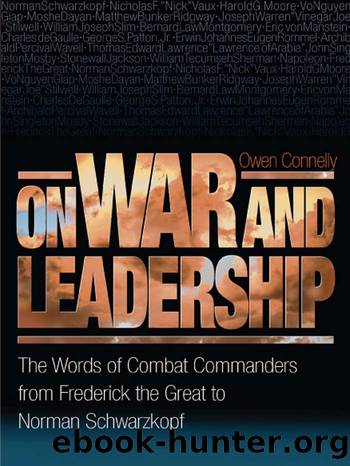On War and Leadership by Owen Connelly

Author:Owen Connelly [Connelly, Owen]
Language: eng
Format: epub
Tags: History, Military, General
ISBN: 9781400825165
Google: KWu4ikq73VMC
Publisher: Princeton University Press
Published: 2009-01-10T01:41:59+00:00
XIII
Joseph Warren Stilwell
(1883â1946)
âVINEGAR JOEâ
GENERAL JOSEPH W. STILWELL was hated by manyâboth those above and below him in the command chain, and casual acquaintances. Irascible, acerbic, he was not a man to âsuffer fools lightly,â even if one of his âfoolsâ was the president of China, Chiang Kai-shek, whom he called âPeanut.â He was one of the great characters of World War II, who earned the nickname âVinegar Joeâ a hundred times over. He was tough, blunt, hard, and yet a man of unchallenged integrityâand a fighter who marched with his men and allowed himself nothing they did not have. Those who really knew him loved him; his staff knew that his leathery face and sharp tongue protected a man who worried about his troops and felt a responsibility to their parents. The few words he wrote on leadership are worth considering.
Stilwell was born in Florida but reared in Yonkers, New York. He graduated from West Point in 1904,and was posted to the Philippines, where he made a reputation for testiness. He also showed an uncanny talent for languages. As a result, although he served as liaison officer with a French corps in Europe in World War I, most of his service was in the Far East. When World War II arrived, he was the best available âChina Hand.â He was sent in 1942,as a lieutenant general, to be chief of staff to General Chiang Kai-shek, president of China, then allied with the United States. Stilwell was also Supremo of the [American] China-Burma-India theater (CBI), and Deputy Supreme Allied Commander, South East Asia to Admiral Lord Louis Mountbatten.
The war in the China-Burma-India theater was complicated by the fact that Britain was fighting to recover Burma, a commonwealth of her Empire, from the Japanese. Americans wanted Burma for roads to China, to facilitate helping Chiang to beat the Japanese by sending weapons and supplies (flown over the Himalayas, âthe Humpâ), to train his troops, and later to prepare them for a postwar battle against Mao Tse-tungâs (Mao Zedongâs) Chinese Communists.1
âVinegar Joeâ Stilwell had many eighteenth-century American attitudes. Hebelieved generals should wear the same uniforms as men, live under the same conditions, and eat the same food. He was often found standing with his men in âchow lines,â and declined most privileges of rank. He seldom wore the three stars of his grade or decorations. He vocally disliked âlimiesâ (the British), especially aristocrats, except, curiously, Lord Mountbatten, 20 years his junior, whom he decided was âa good egg.â2 He despised Chiang Kai-shek because he was devious. The Chinese Generalissimo repeatedly undercut Stilwellâs authority by giving orders directly to his generals.3
Despite his eccentricities, Stilwell was a leader of men. He went out of his way to walk every step with the infantryâChinese or Americanâand saw to his menâs needs. He shunned even the simplest comforts for himself; General Slim (who liked the cynical old man) thought he carried austerity to extremes.
Slim and Stilwell collaborated in a drive that ended with the capture of Myitkyina in August 1944âthe only Burma campaign that included American ground troops.
Download
This site does not store any files on its server. We only index and link to content provided by other sites. Please contact the content providers to delete copyright contents if any and email us, we'll remove relevant links or contents immediately.
The Radium Girls by Kate Moore(10914)
The Templars by Dan Jones(4192)
100 Deadly Skills by Clint Emerson(4084)
Rise and Kill First by Ronen Bergman(4017)
The Doomsday Machine by Daniel Ellsberg(3736)
The Rape of Nanking by Iris Chang(3525)
Killing England by Bill O'Reilly(3459)
Hitler in Los Angeles by Steven J. Ross(3444)
Stalin by Stephen Kotkin(3089)
12 Strong by Doug Stanton(3059)
Hitler's Monsters by Eric Kurlander(2736)
Darkest Hour by Anthony McCarten(2650)
Blood and Sand by Alex Von Tunzelmann(2611)
The Art of War Visualized by Jessica Hagy(2416)
Hitler's Flying Saucers: A Guide to German Flying Discs of the Second World War by Stevens Henry(2299)
The Code Book by Simon Singh(2217)
The Second World Wars by Victor Davis Hanson(2136)
Babylon's Ark by Lawrence Anthony(2073)
Tobruk by Peter Fitzsimons(2064)
